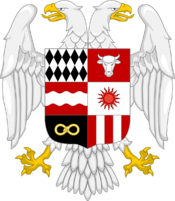Amathian Equalist Republic
This article is incomplete because it is pending further input from participants, or it is a work-in-progress by one author. Please comment on this article's talk page to share your input, comments and questions. Note: To contribute to this article, you may need to seek help from the author(s) of this page. |
Amathian Equalist Republic Ⱃⰵⱂⱆⰱⰾⰹⰽⰰ Ⰵⰳⰰⰾⰹⱄⱅⱐ Ⰰⰿⰰⱚⱐ Republica Egalistă Amathă | |||||||||
|---|---|---|---|---|---|---|---|---|---|
| 1959–1979 | |||||||||
| Capital | East Arciluco | ||||||||
| Common languages | Amathian | ||||||||
| Religion | State Atheism | ||||||||
| Demonym(s) | Amathian | ||||||||
| Government | Unitary one-party republic under a totalitarian Equalist regime | ||||||||
| Premier of the State Council | |||||||||
• 1935-1955 | Maria Arzelean | ||||||||
| Legislature | Great National Assembly | ||||||||
| Historical era | Great Game | ||||||||
| 30 November 1958 | |||||||||
• Established | 24 May 1959 | ||||||||
• Disestablished | 24 December 1979 | ||||||||
• Establishment of the Amathian Democratic Republic | 10 May 1980 | ||||||||
| Currency | Libro (Ⰾ) | ||||||||
| |||||||||
| |||||||||
The Amathian Equalist Republic (Amathian: Ⱃⰵⱂⱆⰱⰾⰹⰽⰰ Ⰵⰳⰰⰾⰹⱄⱅⱐ Ⰰⰿⰰⱚⱐ, tr. Republica Egalistă Amathă) was the official name of the Equalist Amathian regime from 1935 to 1979. The Equalist movement is considered to have traditionally begun during the Piatra Marișa Uprising in 1934, at the end of the Great War. The Equalists led a republican alliance of left-wing forces during the Amathian Civil War which they eventually won, with the Equalist Republic being proclaimed in 1936. The new regime tried to emulate Swetania, organizing itself as a council republic, but from early on, Amathia's precarious position led to changes being implemented, with the new state adopting a firmly unitary stance. The 1937 Constitution established the different levels of the councils and the legislative superiority of the Great National Assembly, and a strong executive in the State Council. The nation adopted a socialist economy but ideologically it remained divided, with the Equalists sharing power with other constitutionally sanctioned socialist and communist parties.
The new republic managed to survive the Solarian War and regain its independence, but its territorial claims against Etruria were ignored by most of the international community, and international recognition of the regime was limited until in 1944. Despite early economic issues due to the damage of the Great War and the war reparations that Amathia had to pay until in 1945, a series of reforms led to a massive economic growth and a strong industrialization by 1955. Narozalica however retained its occupation of West Arciluco, remaining a constant influence on the government. The country tried to assert its independence by seeking closer relations with Swetania and by becoming involved with the Association of Emerging Socialist Economies.
The constant issue of West Arciluco heavily damaged the Equalist regime's popularity however, and Amathian protests against the Narozalic occupation forces were violently suppressed in the 1953 Uprising, which in turn directly led to the Thistle Uprising of 1958. The regime became increasingly more and more repressive as it tried to remain in power, employing the services of the fanatical Authority for the Protection of the Republic and ending the country's political pluralism, forcing all existing political forces to join the League of Equalist Unity . The Constitution was changed in 1959, and the government slowly but surely lost more and more control, becoming dependent of Narozalic military support.
The withdrawal of Narozalic forces from West Arciluco in 1979 and the Arciluco Accords were celebrated as a massive success by the regime, but it was already too late. A rumored clash between withdrawing Narozalic soldiers and protesters in West Arciluco led to massive protests in November 1979, and the violent repression of the Republic Protection Troops turned the protests into an uprising, and then into a revolution. The Equalist regime collapsed throughout December 1979 as most of its leadership was executed, and the Front for the Democratic Refom declared the establishment of the Amathian Democratic Republic in January 1980.


